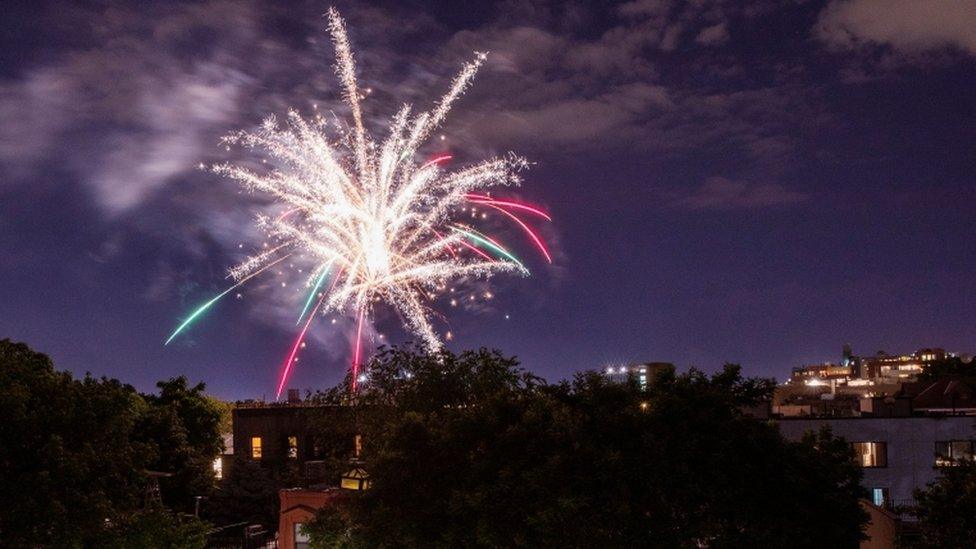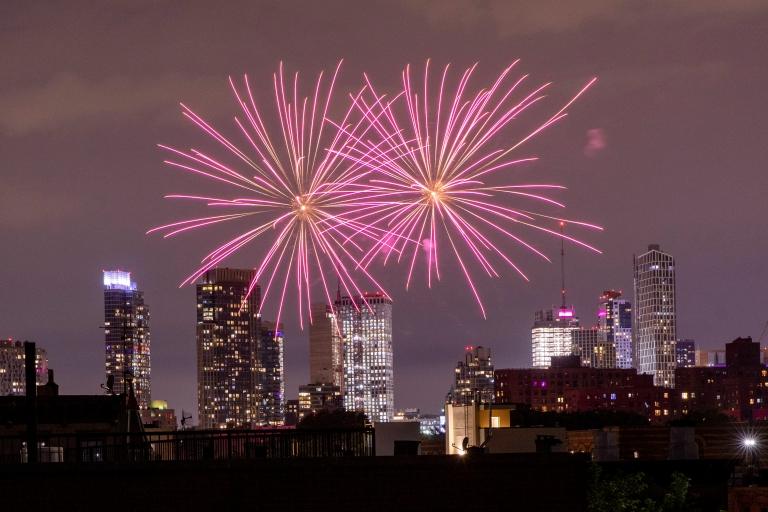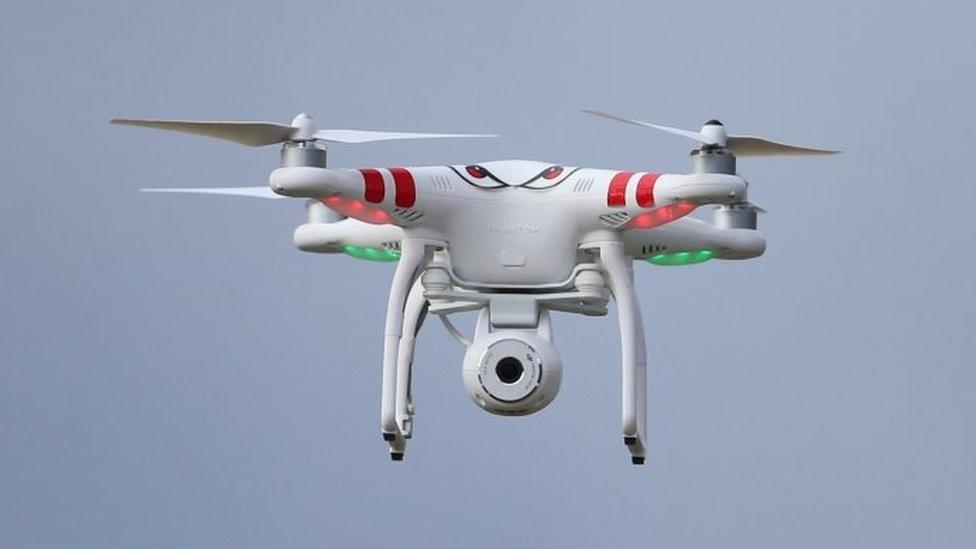Fireworks complaints surge in US cities
- Published

Illegal fireworks illuminate the sky in Brooklyn, New York
Complaints about noise from illegal fireworks has skyrocketed in several US cities in recent weeks, according to local authorities.
Firework usage typically increases during the build up to Independence Day celebrations on 4 July.
But residents of New York, Oakland and other US cities have shared concerns on social media about an increase in night-time pyrotechnics.
It is not immediately clear what is causing the sudden boom in activity.
Consumer firework use regulations vary both between and within states. Illinois, Ohio and Vermont allow sparklers but not fireworks, while Massachusetts bans all consumer fireworks outright, according to the US Consumer Product Safety Commission.
In New York State, ground-based or hand-held "sparkling devices" are allowed, while aerial fireworks and firecrackers are prohibited. In New York City, the rules are even more limited: all types of fireworks, including sparklers, are banned.
By law, US consumers are not allowed to purchase professional grade fireworks.
Earlier this month, Boston Mayor Marty Walsh held a press conference on the boom in fireworks use, where he noted a 2,300% increase in complaints about fireworks to the city's police.
In nearby Braintree, police posted a video of fireworks being set off by a local resident, and called the recent outbreak "a public safety issue."
Allow X content?
This article contains content provided by X. We ask for your permission before anything is loaded, as they may be using cookies and other technologies. You may want to read X’s cookie policy, external and privacy policy, external before accepting. To view this content choose ‘accept and continue’.

Others were shared by local media in the San Francisco Bay Area.
Allow X content?
This article contains content provided by X. We ask for your permission before anything is loaded, as they may be using cookies and other technologies. You may want to read X’s cookie policy, external and privacy policy, external before accepting. To view this content choose ‘accept and continue’.

In New York City, where residents have been grappling with recovery from the country's worst coronavirus outbreak, police reported 24,850 calls for illegal fireworks this year to both the city's 311 informational line and 911 emergency line.
'Whole other level'
It marks an increase of more than 2,000% from that same period in 2019.
The "dramatic increase" has been concentrated in June, with 4,559 calls to 311 coming from the Brooklyn borough alone, police say.
"Every year there are fireworks before and around July 4th, but this year it's on a whole other level," local resident Kate Kroeger told the BBC.
"They seem to start before 7pm... and then it accelerates throughout the evening. This first ones I heard last night were a little in the distance but by midnight they were right outside our window," she added.
"It seems like no one's really stopping it," said Tash, who lives in the Brooklyn area. "It feels like it's getting louder and not going to go away anytime soon. It's been a weird time over the last few months and this is just making things feel even more tense."
In response to the surge, New York City says it will announce a multi-agency task force to combat the illegal "use, transport, and distribution of fireworks".

New York City has seen a more than 2,000% increase in illegal firework complaints compared to 2019.
Around 75% of annual revenue for professional display companies comes from 4 July displays, according to the American Pyrotechnics Association (APA).
But with many events cancelled due to the pandemic, some retailers are offsetting losses by selling consumer fireworks online and offering early bird discounts, according to online magazine Slate.
"This year is an anomaly," APA director Julie Heckman told the BBC. "Consumer firework sales are off to a very early and very brisk start."
And this is the first year Ms Heckman has seen complaints of fireworks "being ignited on a nightly basis".
"I think it's very much due to the pandemic."
After months in lockdown and lingering virus shutdowns, "people are like 'we just want to do something'", she said. "Why they chose to go buy fireworks and light them off every night - I can't answer that question."
The APA estimates that while only a "scant few" of the typical 16,000 Independence Day community firework displays will occur this year due to the pandemic, this 4 July will see record highs in family firework celebrations.
This expected jump in family firework use comes with safety concerns, Ms Heckman says, as first-time users may fail to properly follow common-sense safety precautions.
"We're trying to get that message out," Ms Heckman said.
But as long as pyrotechnics are used safely, and in accordance with local law, the chances of injury remain low.
As pyrotechnics have become more popular, they have also become more safe. Firework injuries between 2000 and 2018 declined by almost 56%, according to the APA, even as use significantly jumped.
Last year, the Consumer Product Safety Commission estimated there were roughly 10,000 injuries attributed to fireworks, less than the 20,000 injuries caused by grilling, or the 15,000 caused by air conditioners.
- Published4 July 2018
